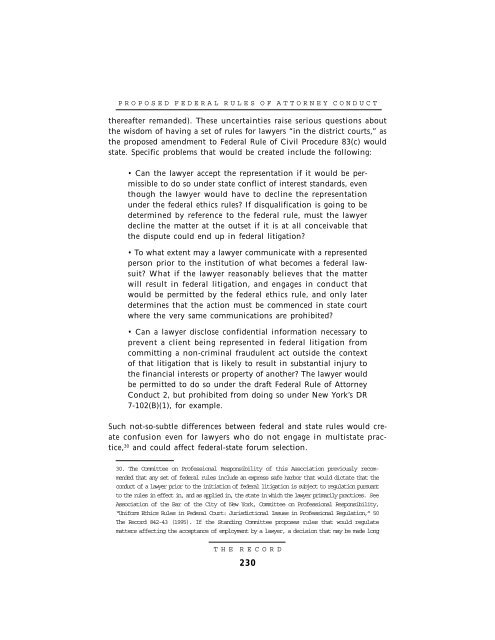THE RECORD - New York City Bar Association
THE RECORD - New York City Bar Association
THE RECORD - New York City Bar Association
You also want an ePaper? Increase the reach of your titles
YUMPU automatically turns print PDFs into web optimized ePapers that Google loves.
P R O P O S E D F E D E R A L R U L E S O F A T T O R N E Y C O N D U C T<br />
thereafter remanded). These uncertainties raise serious questions about<br />
the wisdom of having a set of rules for lawyers “in the district courts,” as<br />
the proposed amendment to Federal Rule of Civil Procedure 83(c) would<br />
state. Specific problems that would be created include the following:<br />
• Can the lawyer accept the representation if it would be permissible<br />
to do so under state conflict of interest standards, even<br />
though the lawyer would have to decline the representation<br />
under the federal ethics rules? If disqualification is going to be<br />
determined by reference to the federal rule, must the lawyer<br />
decline the matter at the outset if it is at all conceivable that<br />
the dispute could end up in federal litigation?<br />
• To what extent may a lawyer communicate with a represented<br />
person prior to the institution of what becomes a federal lawsuit?<br />
What if the lawyer reasonably believes that the matter<br />
will result in federal litigation, and engages in conduct that<br />
would be permitted by the federal ethics rule, and only later<br />
determines that the action must be commenced in state court<br />
where the very same communications are prohibited?<br />
• Can a lawyer disclose confidential information necessary to<br />
prevent a client being represented in federal litigation from<br />
committing a non-criminal fraudulent act outside the context<br />
of that litigation that is likely to result in substantial injury to<br />
the financial interests or property of another? The lawyer would<br />
be permitted to do so under the draft Federal Rule of Attorney<br />
Conduct 2, but prohibited from doing so under <strong>New</strong> <strong>York</strong>’s DR<br />
7-102(B)(1), for example.<br />
Such not-so-subtle differences between federal and state rules would create<br />
confusion even for lawyers who do not engage in multistate practice,<br />
30 and could affect federal-state forum selection.<br />
30. The Committee on Professional Responsibility of this <strong>Association</strong> previously recommended<br />
that any set of federal rules include an express safe harbor that would dictate that the<br />
conduct of a lawyer prior to the initiation of federal litigation is subject to regulation pursuant<br />
to the rules in effect in, and as applied in, the state in which the lawyer primarily practices. See<br />
<strong>Association</strong> of the <strong>Bar</strong> of the <strong>City</strong> of <strong>New</strong> <strong>York</strong>, Committee on Professional Responsibility,<br />
“Uniform Ethics Rules in Federal Court: Jurisdictional Issues in Professional Regulation,” 50<br />
The Record 842-43 (1995). If the Standing Committee proposes rules that would regulate<br />
matters affecting the acceptance of employment by a lawyer, a decision that may be made long<br />
T H E R E C O R D<br />
230

















